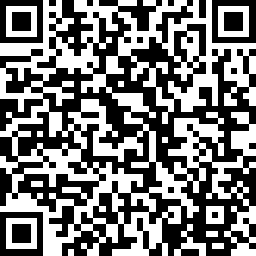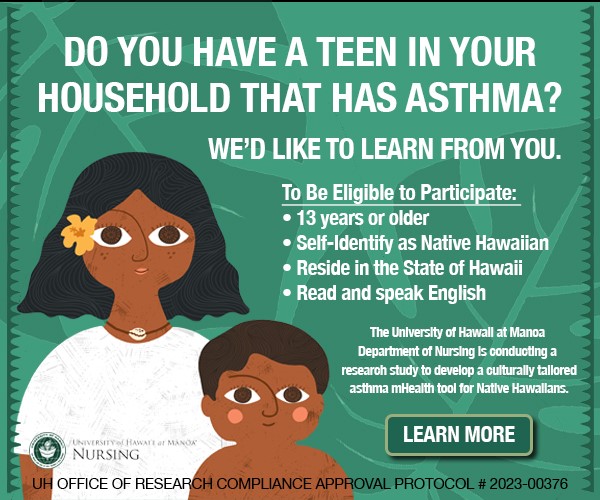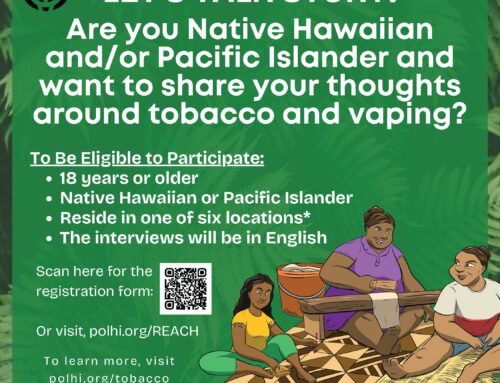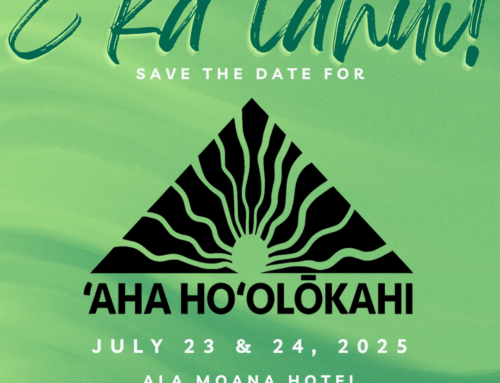Your input into how web-based health tools can easily and appropriately help Native Hawaiians to access information and manage their asthma. We’d like to learn from you.
A talk story session will last about 60-90 minutes on Zoom. A $50 online gift card will be provided for your time and effort.
This research project’s goal is to redesign/redevelop the existing indigenous asthma mHealth tool specifically for Native Hawaiians, with the goal to improve asthma prevention education, asthma control, and access to care.
Asthma remains the leading cause of chronic respiratory illness among Native Hawaiians. Overall Native Hawaiians, have the highest prevalence of asthma, 17%, which is nearly double the rate of all others, 9%. In the State of Hawai‘i, the prevalence of asthma among NH adults is 24.7% as compared to 13.2% for those that identify race as White. Similarly high rates have been noted among Native Hawaiian pediatric populations: 16% of middle and 17% of high school students currently have asthma. Additionally, this disparity is exacerbated among adults and children who reside on neighbor islands and other rural areas.
The shift in how health messages are delivered is one positive aspect of the pandemic. For the first time, a majority (69%) of Native Hawaiians reported accessing trusted online platforms [i.e., social media, vlogs, e-toolkits (e.g., mobile health tools/applications ‘mHealth tool’ or websites), and e-newsletters] to keep updated on health issues rather than accessing in-person resources. However, similar to print materials, online health messaging/materials must consider the cultural relevance of content, impact, and access for Native Hawaiians. To date, asthma-based health resources lack cultural tailoring for Native Hawaiian populations, which has negatively impacted use.
Recent work in Australia with other indigenous populations, specifically the Aboriginal and Torres Strait Islander peoples, identified the positive impact of a culturally-informed asthma mHealth tool (mobile app + webpage). Utilization of this mHealth tool 1) improved short-term asthma knowledge among Aboriginal and Torres Strait Islander parent/guardians of children with asthma, and 2) served as ongoing culturally-informed asthma resource that was easily accessible and able to communicate vital health information between the health care provider and the patient or parent/guardian.
The study team will work in partnership with Papa Ola Lōkahi, the Native Hawaiian Health Board, utilizing a community based participatory research methodology. The redesign will ensure alignment with the Hawai‘i Department of Health’s Asthma Plan 2030, specifically to improve asthma management among those most at-risk. With permission and support from the Australian team, we will utilize the existing tool’s content for the redesign. This study is approved by University of Hawaii Office of Research Institutional Review Board protocol #2023-00376.
This study is being done by Donna-Marie Palakiko, PhD, RN, APRN. Donna-Marie is a nurse and faculty at the University of Hawai‘i at Mānoa in the Department of Nursing.




